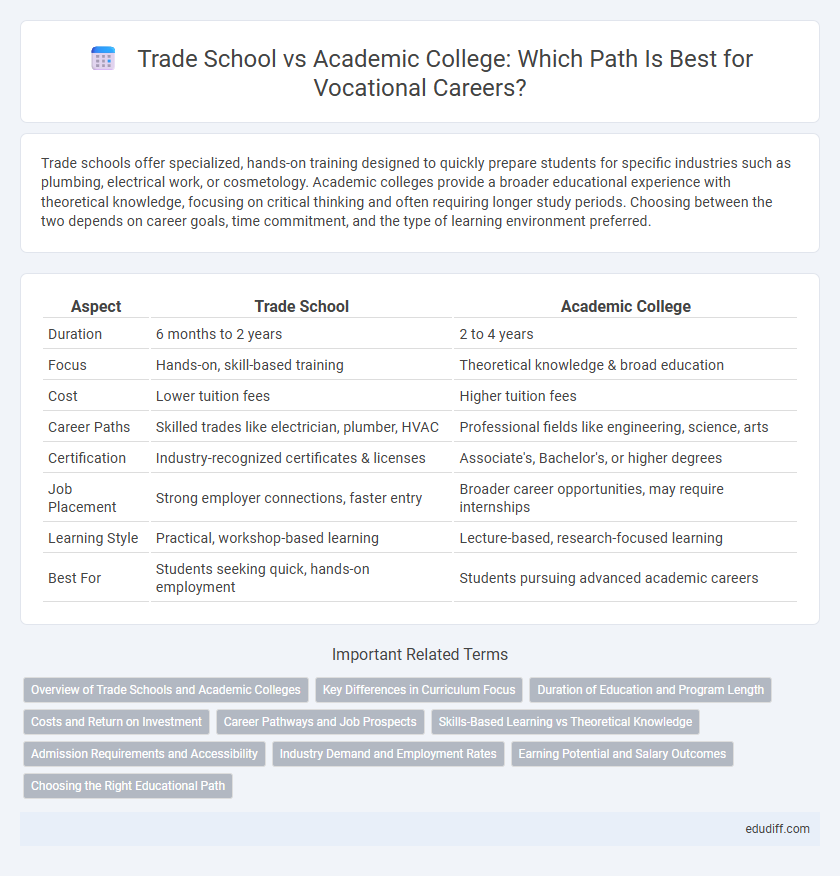Trade schools offer specialized, hands-on training designed to quickly prepare students for specific industries such as plumbing, electrical work, or cosmetology. Academic colleges provide a broader educational experience with theoretical knowledge, focusing on critical thinking and often requiring longer study periods. Choosing between the two depends on career goals, time commitment, and the type of learning environment preferred.
Table of Comparison
| Aspect | Trade School | Academic College |
|---|---|---|
| Duration | 6 months to 2 years | 2 to 4 years |
| Focus | Hands-on, skill-based training | Theoretical knowledge & broad education |
| Cost | Lower tuition fees | Higher tuition fees |
| Career Paths | Skilled trades like electrician, plumber, HVAC | Professional fields like engineering, science, arts |
| Certification | Industry-recognized certificates & licenses | Associate's, Bachelor's, or higher degrees |
| Job Placement | Strong employer connections, faster entry | Broader career opportunities, may require internships |
| Learning Style | Practical, workshop-based learning | Lecture-based, research-focused learning |
| Best For | Students seeking quick, hands-on employment | Students pursuing advanced academic careers |
Overview of Trade Schools and Academic Colleges
Trade schools emphasize hands-on training and skill acquisition in specific trades such as welding, plumbing, or automotive repair, often resulting in industry-recognized certifications. Academic colleges provide a broader educational experience with theoretical and general education courses leading to associate, bachelor's, or advanced degrees across disciplines like humanities, sciences, and business. Trade schools typically offer shorter programs that prepare students for immediate employment, while academic colleges focus on comprehensive knowledge development and career flexibility.
Key Differences in Curriculum Focus
Trade schools emphasize hands-on training and practical skills tailored to specific trades such as plumbing, electrical work, or automotive repair, ensuring immediate job readiness. Academic colleges concentrate on theoretical knowledge and broad-based education, fostering critical thinking and foundational principles in fields like humanities, sciences, and business. The curriculum in trade schools is often shorter and directly aligned with industry certifications, while academic colleges offer extended programs that may lead to advanced degrees.
Duration of Education and Program Length
Trade school programs typically range from six months to two years, offering accelerated, hands-on training tailored for specific skilled trades such as welding, automotive repair, or cosmetology. Academic colleges generally require two to four years for associate or bachelor's degrees, encompassing broader theoretical coursework alongside practical knowledge. The shorter duration of trade schools enables faster entry into the workforce compared to the extended program length of academic colleges, which may prepare students for more diverse career paths.
Costs and Return on Investment
Trade schools typically offer lower tuition costs, averaging $5,000 to $15,000 per program, compared to academic colleges where annual tuition ranges from $20,000 to $50,000. Graduates of trade schools often experience faster entry into the workforce, leading to quicker return on investment with median annual salaries between $40,000 and $60,000 in skilled trades. Academic colleges may provide higher long-term earning potential but require significant upfront investment and longer time to graduation, impacting overall cost-effectiveness.
Career Pathways and Job Prospects
Trade schools offer specialized training for skilled trades like electrician, plumbing, or HVAC, leading to quicker entry into high-demand jobs with competitive salaries and hands-on experience. Academic colleges provide broader education in fields such as engineering, business, or healthcare, often requiring longer study but opening doors to a wider range of professional careers and advanced degree opportunities. Both paths influence career outcomes differently, with trade schools typically excelling in immediate workforce readiness and academic colleges in long-term career growth and advancement.
Skills-Based Learning vs Theoretical Knowledge
Trade schools emphasize skills-based learning by providing hands-on training tailored to specific careers such as welding, plumbing, or electrical work, which prepares students directly for the job market. Academic colleges focus on theoretical knowledge and broad educational foundations through lectures and research, offering degrees that may lead to various professional fields or further study. The practical approach of trade schools ensures immediate workforce readiness, while academic colleges develop critical thinking and conceptual understanding beneficial for long-term career flexibility.
Admission Requirements and Accessibility
Trade schools prioritize practical skills and often have minimal admission requirements, such as a high school diploma or GED, making them more accessible to a broader range of students. Academic colleges typically require standardized test scores, transcripts, and more rigorous admissions criteria, which can limit accessibility for some applicants. The streamlined admission process at trade schools enables faster entry into the workforce compared to traditional academic pathways.
Industry Demand and Employment Rates
Trade schools align closely with industry demand by offering specialized, hands-on training in fields such as welding, electrical work, and HVAC, resulting in higher immediate employment rates compared to academic colleges. Graduates from vocational programs often enter the workforce faster, addressing skill shortages and meeting employer needs in sectors like construction, manufacturing, and healthcare. Academic colleges provide broader theoretical knowledge but may face longer job placement times and varying employment rates depending on the field of study.
Earning Potential and Salary Outcomes
Trade school graduates often experience faster entry into the workforce, resulting in earlier earning potential compared to academic college graduates who typically spend more years in education. Skilled trades like electrician, plumber, and HVAC technician offer competitive salaries, frequently matching or surpassing those of bachelor's degree holders in non-specialized fields. Salary outcomes in vocational careers frequently benefit from high demand and practical experience, enabling trade school alumni to achieve substantial income growth without incurring significant student debt.
Choosing the Right Educational Path
Selecting the right educational path between trade school and academic college depends on career goals, learning style, and industry demand. Trade schools offer hands-on training and quicker entry into skilled trades like plumbing or electrical work, often resulting in lower tuition costs and shorter programs. Academic colleges provide broader theoretical knowledge with opportunities for advanced degrees, favoring careers in fields such as engineering, healthcare, or business management.
Trade School vs Academic College Infographic

 edudiff.com
edudiff.com